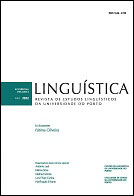Communication, Manipulation, Seduction: The Pragmatics of Transparency
Resumo
Communicative interaction is never fully transparent. A definition in terms of pure transfer of information is an impoverishment of the semantic content of a message. Other emotional connotations of linguistic interaction are deeply rooted into the depth of the psychology of subjects. This means that the interaction is often manipulatory and even seductive. This paper tries to present in a more systematic way the conditions of manipulatory and seductive discursive production. Speech acts theory (Austin, Searle) and conversational logic (Grice) offered some tools to formalize more or less these subtle production conditions of non-transparent “communication”.
Referências
Alberti, L. B (1992). De la Peinture (J. L. Schefer, Trans.). Macula Dédale. (Original work published 1435).
Baudrillard, J. (1983). Les stratégies fatales. Grasset.
Jullien, F. (2017). De-coïncidence. D’où viennent l’art et l’existence. Grasset.
Nietzsche, F. (1954). in Walter Kaufman, ed., The Portable Nietzsche (pp.46-47). Viking Press.
Parret, H. (1994) Indirection, Manipulation and Seduction in Discourse. In H. Parret (Ed.), Pretending to Communicate (pp. 223-238). Walter de Gruyter.
Parret, H. (2016). Histoires et images du voile de Maya. In M. Leone, H. de Riedmatten, & V. I. Stoichita (Dir.), Lexio. Il sistema del velo/Système du voile (pp. 309-334). 19. Aracne Editrice.
Proust, M. (2012). In Search of Lost Time (Vol. 2) (C.K. Scott Moncrieff and Terence Kilmartin, Trans.). Knopf Doubleday Publishing Group. (Original work published 1009).
Downloads
Publicado
Edição
Secção
Licença
Direitos de Autor (c) 2022 Linguística: Revista de Estudos Linguísticos da Universidade do Porto

Este trabalho encontra-se publicado com a Creative Commons Atribuição-NãoComercial 4.0.



